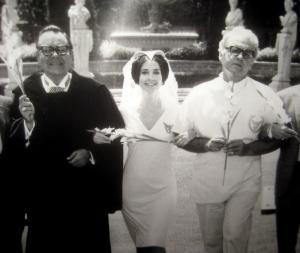
Source: Flickr user Brecht Bug
License: Creative Commons
The nigher the end, the wonkier the appetite. Whether it’s Jay and Silent Bob in Dogma (1999) or General Jack D. Ripper saving his precious bodily fluids ahead of nuclear annihilation in Dr. Strangelove (1964), expecting our shared finale induces extremes. The gnostic sects of the first couple centuries AD were either orgiasts or ascetics, while today Proud Boys compete with new family structures held together by Blackstonian polygamy. The apocalypse is a comedy gold mine for the soul brave enough to stare into that darkness ahead of the great fiery flash.
Who better to treat these ironies of the eschaton than Evelyn Waugh? An anti-Vatican II Catholic to the right of Senator Joseph McCarthy, Waugh’s mix of cranky haughtiness and clear-eyed wit make his politics a kind of plus—arrogant asses have their talents. Indeed, this wasn’t his first rodeo (or the English equivalent—fox hunting). He, for example, tears at the aristocracy of his native England in Brideshead Revisited (1945). After the war, he relished the defeat of Churchill and the Tories for a day before despairing at Labour’s ascendancy. Chip, as always, atop his shoulder, Waugh was incensed to find the Yankees loved Brideshead. His revenge was typically cold: he’d fly with his wife to meet with MGM executives about turning that novel into a movie. A weekly allowance would keep his pockets stuffed and he’d come up with whatever excuses possible to milk the fat American cow before getting out of Dodge. The Loved One (1948) emerged from his experiences stateside, developing into an unsparing portrait of Hollywood, British expats, and the wonderful world of modern mortuary science.
This brief comic novel would eventually become the 1965 movie of the same name. At a time when the studio system was desperate to recapture audiences, the book’s wacky satire and sucker punching of sacred cows seemed worth a shot at adapting. Director Tony Richardson, then a star of the British New Wave, came on to helm the project while Christopher Isherwood, an English expat living in the US and a gay Modernist author whose semi-autobiographical novel about Weimar-era Berlin became Cabaret (1966), agreed to work on the screenplay. Supplementing (perhaps in the Derridean sense, depending on who you ask) his effort, Tony Southern, an American author who hopped around the globe, tried to infuse the script with the nauseous cocktail of dread and laughter made famous by his work in Dr. Strangelove and The Magic Christian (1959). A then-largely unknown Hal Ashby even edited the picture!
History has not been kind to The Loved One. Upon release, it was panned and stuck an ailing MGM with another flop. Waugh tried to get his name taken off the movie but died three days after its release (fittingly enough, it’s suspected he never watched it). Words like “uneven” and “unfocused” come up a lot. Some critics have tried to rehabilitate the film, calling it a masterclass in British New Wave film techniques (e.g., jump cuts) that presages the coming counterculture—a monumental movie born premature. The only real point of agreement is that the thing is knee-slappingly funny at times; it’s got some real zingers.
The plot is really a clothesline for such gags and sucker punches. A young English wastrel and wannabe poet (same difference, I guess), Dennis Barlow (Robert Morse) flies to Los Angeles to meet (and use) his uncle, Sir Francis Hinsley (James Gielgud), a longtime production staff manager at a major Hollywood studio. The knighted stagehand is gracious in receiving his nephew, but frustrated with his current assignment: transforming cowboy actor Dusty Acres (Robert Easton) into a 007 figure. Pumpkin into a carriage—sure. Frog into a prince—sure. But no one can turn a hayseed into James Jesus Angleton.
Dismissed flippantly despite three decades of loyal work, Sir Francis hangs himself, leaving Dennis money and the social support of the local expat club, the head of which tells him he just must have his uncle buried at Whispering Glades Cemetery. His countryman’s (let’s say) imperative suggestion reflects the two cultures under the spotlight here: the formal necessity of a prestigious burial presented politely and demurely captures English stuffiness, while the graveyard itself, glammed up like Marisa Tomei in My Cousin Vinny (1992) captures crass American glitz. Dennis folds, perhaps because he’s too British; perhaps because he’s simply too apathetic.
Whispering Glades provides the backdrop for much of the film’s overlong two-hour runtime. Here, the young scribbler meets Aimée Thanatogenos (Anjanette Comer), a young, prim assistant who brushes wigs for “the loved ones” (the bodies) and worships the place’s founder, Revered William Glenworthy (Jonathan Winters). Pitching caskets with gusto to Dennis is Mr. Starker (Liberace) (“I can give you our eternal flame in either perpetual eternal or standard eternal”). But the greatest weirdo of all is the muscle magazine reading, mother-obsessed mortician, Mr. Joyboy (Rod Steiger), whom we meet in a hilarious sequence in which the film quickly cuts back and forth between his puzzling face and the various absurd expressions he’s trying out on Sir Francis’ corpse. Aimée is the only true believer of the group. The reverend calls the bodies “stiffs” when no one is listening; he’s a Three-card Monte dealer who realized the big cash was in burying the rich and stupid. And Mr. Joyboy, well, we’ll come back to him.
From here two intersecting plotlines emerge: on the one hand, we watch as Aimée looks for love by writing to a newspaper romance expert called Guru Brahmin (Lionel Stander), who is in reality a washed-out hired pen and wino with enough disdain in his sweaty, puffed-up face to make Andre the Giant feel small. Her two suitors are naturally Dennis (who takes a job with the reverend’s brother and proposes that they get hitched so he can live off her income) and Mr. Joyboy (whose one “date” with his coworker is among the funniest things I’ve ever seen). On the other, there’s the cemetery’s owner, who is running out of space and thus profit (and thus interest in this particular profession); his solution is wonderfully vampiric—make it a retirement home. The elderly and infirm are blood banks waiting to be drained, kept alive just enough to keep producing (not that that could ever happen in real life!). In beautiful 60s fashion, his plan to get rid of all the bodies has all the maniacal simplicity of Dr. Strangelove’s fascist arm—shoot them into space. How will he get the rockets, you ask? Why, he just invites a bunch of Air Force generals to an orgy at Whispering Glades. How else was The Loved One supposed to have a scene where a bunch of old men and young women go at it in a room full of coffins? Thanatogenos indeed.
These two tracks are not the real attraction though. Dennis is a lout who tries to pass off famous verse as his own to impress the simple-minded Aimée. She herself is a vapid zealot whose cause, we know almost immediately, is a waste (she tells Dennis that she’s named for Pentecostal proto-televangelist Aimee Semple McPherson). Her other choice, Mr. Joyboy, is lunatic-mortician Waylon Smithers. There’s not much to root for except the continued embarrassment of this rogues’ gallery.
Comedy—that’s what keeps us watching—comedy with some edge. The date between Mr. Joyboy and Aimée (you can watch it here) has them enter his house with groceries, only to immediately burst into “the center of things around here,” his mother’s room. As the door swings open we follow the mortician through toward a gigantic woman (by today’s standards, let alone those of the 60s) in bed. “There’s my boy! There’s my boy!” Mrs. Joyboy (Ayllene Gibbons) screeches as her son begins laying food on her stomach. “This is mom.” She begins to devour the food with reckless abandon, as a couple quick cuts back to Aimée show her sheepish, confused, and perhaps frightened smile. Meanwhile, Mr. Joyboy brings over his mother’s pet bird. “Say hello” he lisps in half-puppy talk. “There is no death! There is no death!” the bird happily chants. Aimée’s face looks totally forlorn: could anyone say anything worse than that to her? I mean, come on—her last name means “Death-born” in Greek! Mr. Joyboy, blissfuly unaware, explains: “Mama taught him that. She believes in positive thinking!”
Amidst the chaos, the mortician happily inquires: “what do you think of the family?” After a half-breath and nothing kind on deck, Aimée is saved by a squeal of joy. “It’s time for King Chicken!” “Mama never misses her King Chicken,” he dutifully explains. Mr. Joyboy rushes out as his mother tunes into a commercial. “I can barely tell I’m on a diet. This must be King Chicken!” Mrs. Joyboy smacks her lips and starts breathing heavily; we cut to a close-up in which her eyes seem to stare far beyond us, intent on the screen. Only the end of the ad seems to calm matters down. But just as she’s made a joke to be met with a polite snicker, we rapidly cut back to her face, now from a lower angle. “7:38—time for Big Boy Crab!” Huffed up once again, Mrs. Joyboy descends into an ecstasy so sublime not even Bernini could capture the jouissance. “Oh, it’s a new one! It’s a new one! They’re using a giant one! Oh, they’re using a giant one now! Oh God!” “It does look delicious, doesn’t it?” the just returning mortician politely inquires. The mother keeps up the cultic chant until her son returns with a whole roast pig on a platter, singing a song that ends with “Mama’s little Joyboy has piggy for mom.” With the cooked hog right up against her side, she digs in ravenously as Aimée looks on in horror. The awkward anxiety of the whole thing now gives way to a montage set to blaring horns as low close-ups show Mrs. Joyboy tearing away the pork flesh.
A lot to take in, right? And I didn’t even mention the part (accessible here) where her confused suitor buys “the biggest, juiciest lobsters” by the dozen (“like eggs,” he says) so he can cook them for his mother. The people at the market sing and dance: “Here comes the lobster man! Here he comes!” Not to be outdone, he dances in return and chimes: “Mama’s little Joyboy wants lobster, lobster! Mama’s little Joyboy wants lobster for mom.” When he puts the lobsters down before his mother, however, the dream changes and they come back to life, clawing at her flesh. She tears at the sea bugs as her son cries, knowing he’s disappointed her again. There are simply too many and she’s stripped to the bone “until finally…there’s no more mom.”
The intensity of the humor strikes at the heart of our society (then and now). In the mother, we have the externalization of mid-century consumer culture, a parody of patriotic citizen who prefers to salivate at ads rather than actually watch any programming. There is no death so long as there’s endless food and brain-massaging content. Consumption is the only orgasm left. Her queer son’s slavish devotion masks an inability to escape the mutually assured destruction that is their relationship—a representation, perhaps, of the dark side of suburban family life or the lonely depths of the closet (writer Christopher Isherwood was gay; director Tony Richardson was bisexual, a fact the world only learned when he suddenly died of AIDS). The reverend is a good ole American confidence man, a whited sepulcher who uses the sacred to profit, conspiring Fat Leonard-style with military brass to blow up the dead and suck dry the living—in essence, the figure who has come to define this great land more than any other. Aimée is a gullible simpleton who actually believes the cemetery owner’s lies. And Dennis—Dennis is an empty shell, the vacuity of so much pretend youth rebellion of the sort that would emerge shortly thereafter (not that there wasn’t genuine sentiment there—but not every mod or hippy cared for communistic easy living and peace). The gang’s all here.
While The Loved One may be uneven, it’s far from unfocused. Over-ambitious perhaps, the film’s hectic production shows; it is no Dr. Strangelove, even if the two movies share a writer and similar themes. But Kubrick’s horrifying black comedy is among the greatest films ever made. To fall short of that can still mean greatness. Though this Tony Richardson effort doesn’t land every jab, it laughs hard—and makes us laugh hard—in the face of nuclear apocalypse. It has a perspective, a vision, just a deeply cynical one in which we’re left with little to do but lampoon, lampoon, lampoon until the rocket explodes and we can lampoon no more. Waugh probably never saw it and he would have hated it for being so American. But its blithe rancor matches his own; I’d call that a success.













